Vagabond: Beautiful Lessons in Takehiko Inoue’s Manga
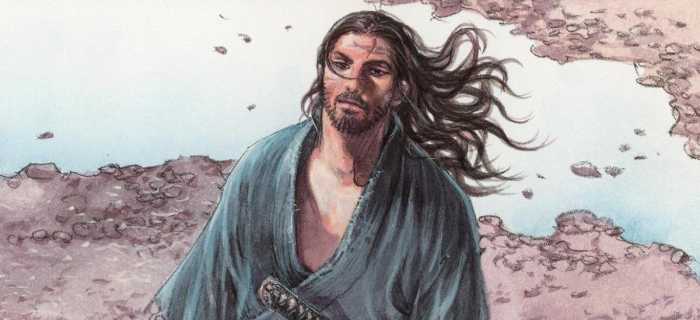
Great warriors and mythologies are themes that are always present in people’s imagination. It’s a taste that has many influences and different origins, but it’s always something that calls attention. And a class of great warriors that is highly acclaimed, are the Samurai.
Idealistically, everyone knows what a samurai is or at least can draw a picture of one. “Great warriors with armor and swords killing each other in some corner of Japan”. This is not a wrong analogy at all because for many things in life, it is the stereotypes that define them. And sometimes it’s okay. However, let’s do a brief introduction.
Who were these guys?
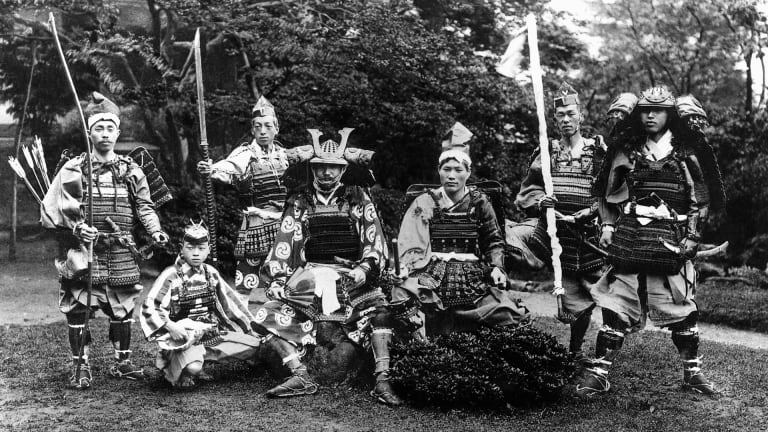
The Samurai were a class of warriors in feudal Japan. They emerged around the 12th century and lasted until the end of the 1800s. Of course, there are other versions for these dates, but these data are not my purpose here in this post. This class emerged during an important political and civil war context in Japan. Initially, they were hired as private warriors by large land owners, but over time they gained power and influence, even becoming a ruling class in Japanese society.
Samurai were basically trained in martial arts, archery, sword and horsemanship. And they also wore armor, posing as warriors. Hence this Samurai construction that we have in our heads. It did not come from nothing.
But the cool thing is that they weren’t just brutal warriors skilled in the Katana. In addition to style (with clothes and hairstyles typical of the class), the samurai also dedicated a good deal of time to education and culture. They practiced calligraphy, poetry, art and followed a hell of a code of etiquette and conduct, created by themselves and named Bushido.
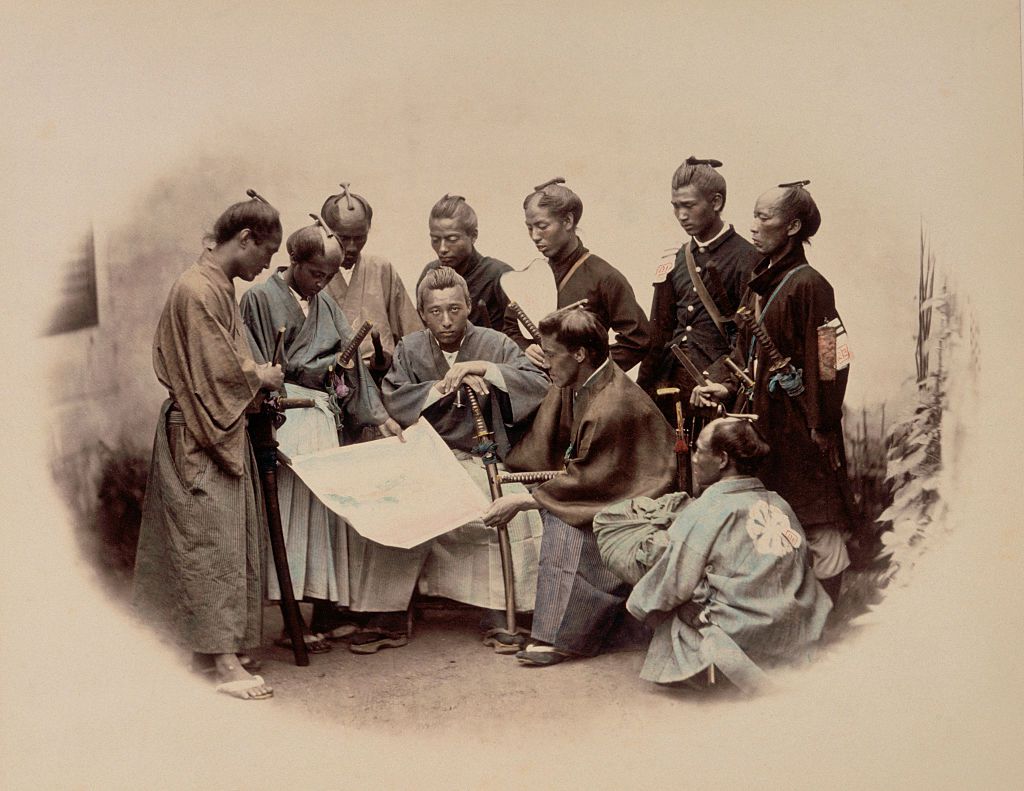
The legacy of the Samurai
Although this “Samurai Era” kind of ended around the 1800s, when the Japanese government began to modernize and centralize power, its legacy continues to influence Japanese culture and society even today.
Well, like any real history of humanity, the Samurai also had their issues. Participation in controversial events, questionable attitudes towards their own code, in short, there are several problems that we can find throughout the history of these warriors. But let’s focus on the good stuff.
Although they no longer exist for a long time, there are many lessons that can be learned from their lifestyle and concept of life:
- Discipline: They were very disciplined, in many ways. They followed rigorous training and were known for a high standard of behavior.
- Honor: This was a central concept in the samurai way of life. They were utterly loyal to their lords, defended their honor and maintained their dignity, even in the face of the hardest adversity or even death.
- Respect: Samurai showed a lot of respect for their superiors, but also for their enemies and opponents. They understood that all individuals deserve to be treated with dignity.
- Courage: They were also known for their bravery and willpower in the face of their fears. They fought for what they believed was right, regardless of the situation.
- Perseverance: Samurai have always shown a lot of perseverance and determination. These guys never gave up, no matter how difficult the task was or how long it took to reach their goals.
- Humility: Despite their skills and status at that time, samurai were (or sought to be) humble and avoided ostentation. They understood that true strength comes from inner peace and the ability to remain calm and centered even in the face of challenges.
As mentioned before, a lot of controversial things also happened during this period, after all, we are talking about human beings. But it’s still fascinating the mentality of this class as warriors. And there was a samurai who not only elevated everything the class stands for, but also became the most important character in this style of warriors.
The greatest samurai of all time
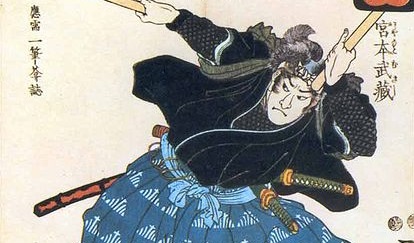
The greatest warrior of this class was certainly Miyamoto Musashi. It is estimated that he lived between the 16th and 17th centuries. Musashi is the symbol of Bushido even today. He started as a young swordsman and gradually developed his own fighting style until he reached his final form, where he wielded two swords at the same time in his fights. The guy was a badass. It is further said that he fought about 60 duels, winning the majority, most famously against Sasaki Kojiro, which he won using his cunning and unique fighting style.
Musashi, like all great samurai, also dedicated himself to art and philosophy. He wrote several things about strategy, martial arts and even has a book: “The book of five rings”, which is a classic until today.
Anyway, he was an extraordinary samurai and left a pretty cool legacy. And it is also the main inspiration of the mangaka Takehiko Inoue in his greatest work.
Vagabond
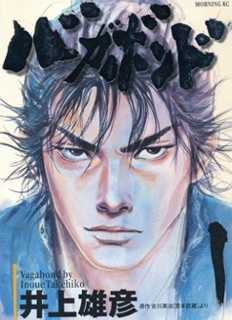
Vagabond is an unfinished Manga series written and illustrated by Inoue. He is also known for other very good works like “Slam Dunk” and “Real“.
The story is based on Musashi and his journey as a Samurai. Throughout the plot he undergoes several transformations, from youth to becoming a disciplined and powerful warrior. And, of course, he faces many battles.
Throughout the story, Musashi confronts his own demons, including his violent past and his search for meaning in life. It’s a complex and richly layered character, torn between his hunger for power and his deep desire to understand the world around him. The manga is amazing and explores all samurai themes like honor, loyalty, self-discovery, etc.
But it’s the philosophical side of Vagabond and the entire structure that builds Musashi that makes this manga so special. Vagabond is very complex and touches on many things, which the readers can even bring into their lives as Musashi’s entire journey takes place through a profound study of self-knowledge, violence, understanding and the meaning of life. In this article, we will go through some of them.
Self Knowledge
“Do you see how infinite you are?”
Knowing yourself is perhaps one of the most important things, especially in the current generation. And that’s always been an important issue for me as well. Our transformation as a human being goes through this. And self-knowledge is one of the central themes in Vagabond. Musashi always sought meaning for life and for his own attitudes, and this came about through a deep self-exploration and transformation. In the beginning, Musashi was just a wild youth, filled with a desire for power and glory. But everything changed when his future master, Takuan, entered his life.
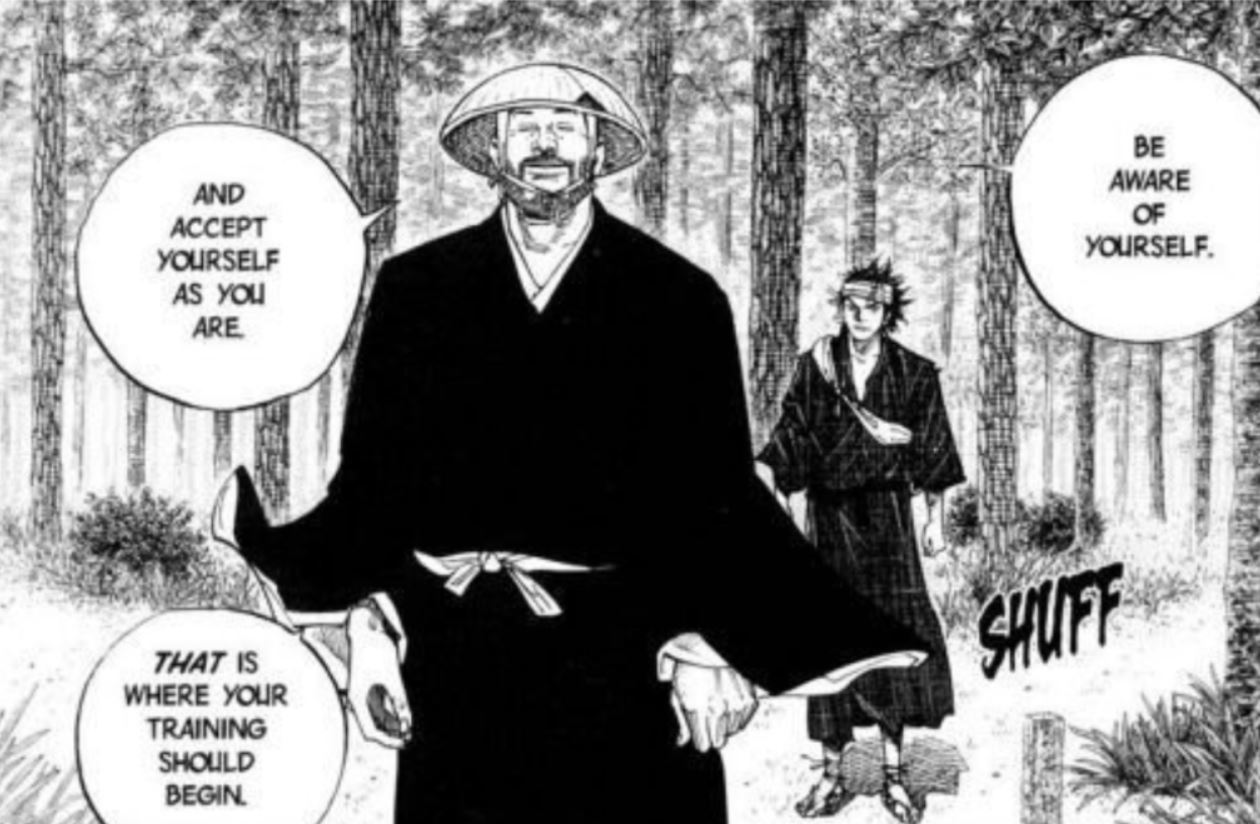
Takuan teaches Musashi, who was previously called Takezo, that the true battles are the internal ones, and these help us to understand our place in the world and seek more fulfillment in our existence, learning to appreciate more the simple things in life and human connections. As he gets to know himself, Musashi faces his weaknesses and fears. He struggles with his past, his feelings of guilt and the shame of who he was to finally find peace and acceptance.
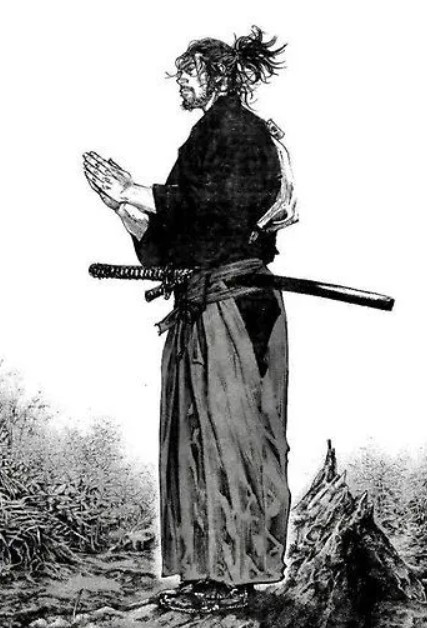
Internal Conflicts
“If you are swimming in the ocean, you will never realize how truly vast it is”
Musashi’s complexity lies mainly in his inner dilemma and in his deep and spiritual will, in several senses, to bring more light to himself and to his steps. Despite being skilled with the katana, Musashi’s attitudes caused him some suffering. His motivations, his love dilemma, his ego and fear of failure, all of this contributed to the construction of a character in constant questioning with himself and with countless layers of development.
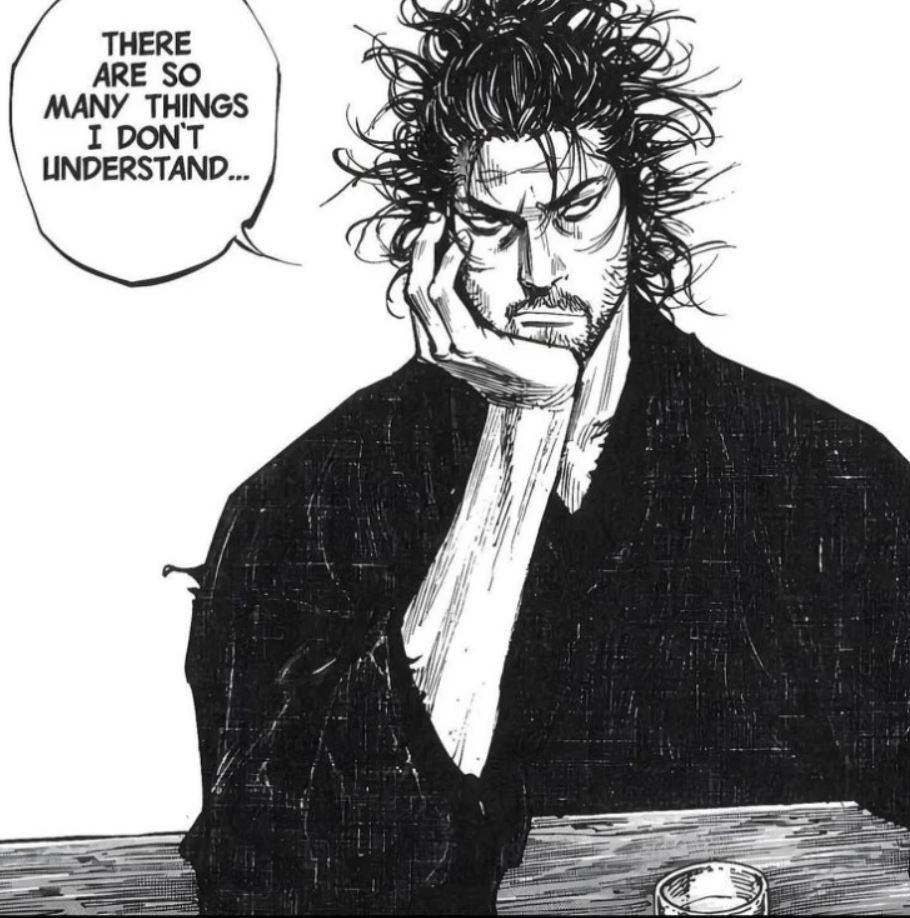
By looking deeper into himself, Musashi sees beyond the limitations he has built and his unique mindset to be the strongest. He really understands everything around him, accepts his fears and overcomes them. And this is his first step. Because even though his perceptions are clouded by the idea of “victory”, he has achieved a sense of greatness and vision that far surpasses what he was before.
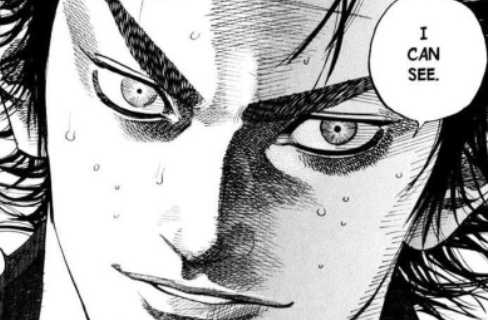
Again, Vagabond is not a 100% finished manga, so many of its conflicts are not completely answered either. Musashi is always confronting his demons and perhaps that is part of anyone’s growth process. The path to inner peace, to self-knowledge, is very difficult. But it is necessary to go through it if we really want to be happier.
The seek for perfection
“What does it mean to be invincible?”
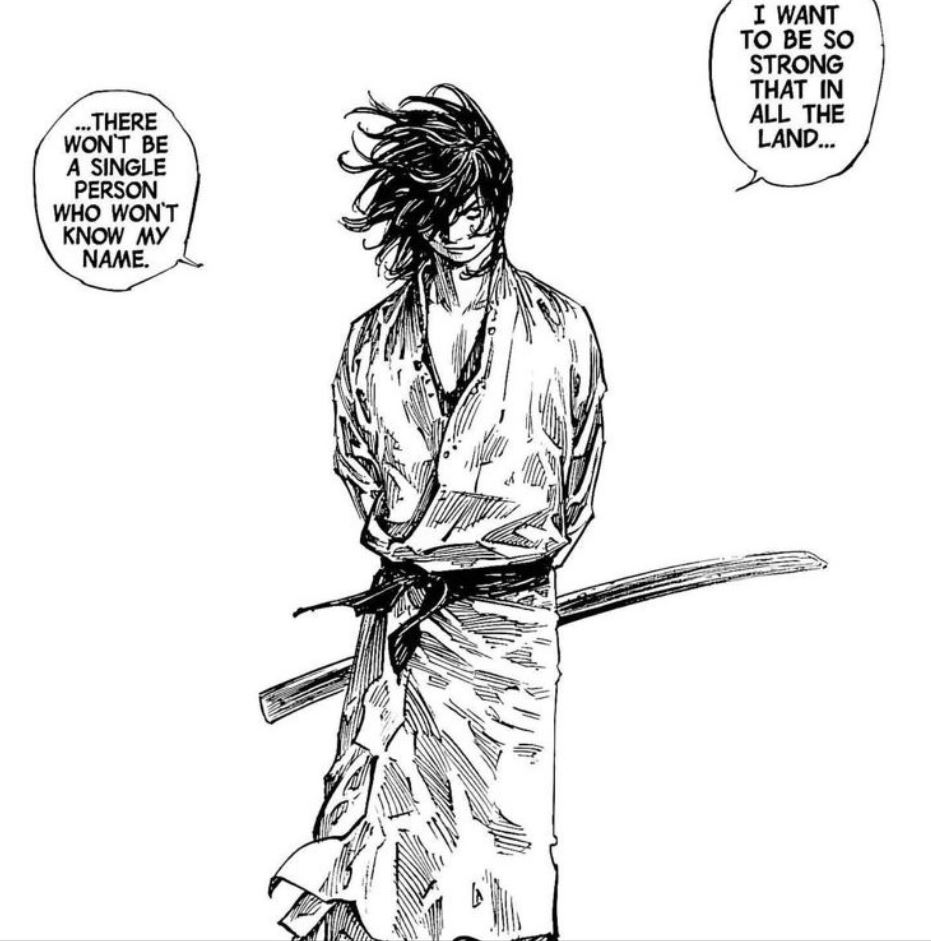
The pursuit of perfection was perhaps Musashi’s primary motivational factor. The desire for total mastery of the sword, the hunger to fight, to face a stronger opponent and, above all, the will to become invincible.
Musashi was blind to everyone but himself. He was taken by ambition and even a certain selfishness. It happens that, throughout life, we meet people with other experiences, perspectives and many times stronger than us. And this is not talking about physical strength. It is precisely the contact with these people, with these different views of life, that made Musashi finally understand the meaning of “invincible”.
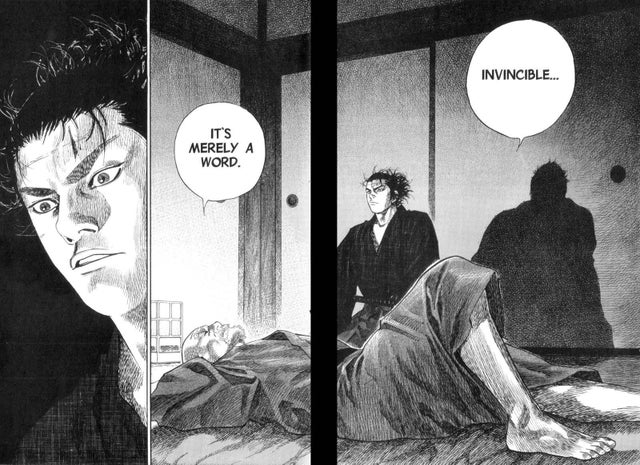
Along his journey, Musashi understands the value of discipline, focus and perseverance. He also develops its own fighting style. These factors, combined with his natural ability to fight, turn him into a samurai totally out of line, well above average and one of the most feared in Japan. And that says a lot about his unbridled quest to be perfect. True success goes through personal growth, and through confrontation with the ego and internal fears. In this sense, the value of success is not in the end goal itself. It’s not about becoming invincible, it’s not about perfection. It’s actually about the path to there, and everything that builds on that path. This is the journey of a lifetime and requires a lot of willpower to face your own limitations.
The cost of violence
“So you want to die honorably? You are being selfish. Each and every person you killed had his own life. Whether that life was blessed or not…everyone is born into this world … they grow up…some people have family…some are alone in this world…some have young children…some are engaged…some have pets…some people have high hopes and great dreams…other have no ambition at all and you ended everything for them, Takezo. You killed them.”
As much as many philosophical concepts are taken from Vagabond, the manga is quite violent, reflecting what Musashi’s days as a samurai were like. And he even has to face the violence itself. The plot of Vagabond takes place in a context of a very violent society. In the background, we have a world where it is necessary to use violence to defend yourself or those you love. The cost of this is very clear when we look at the pain that all this causes, both in individuals and in society as a whole. And Musashi’s thirst for power puts him face to face with the rawest form of it all, where he practically personifies violence itself.

It could take another whole article just to talk about the violence in Vagabond and Musashi’s trajectory. This is the heaviest aspect of the plot, it is fundamental to the character’s evolution and has its milestone in Yoshioka’s battle. Not only is this passage the highest point of Vagabond, it is also the turning point of the entire Musashi story. It takes place at the Yoshioka school of swordsmen and is a brutal and bloody confrontation, where Musashi demonstrated how powerful he had become. Musashi fought around 70 men and took the lives of most. Graphically, what Takehiko does in the Yoshioka arc is out of this world. He is a genius.
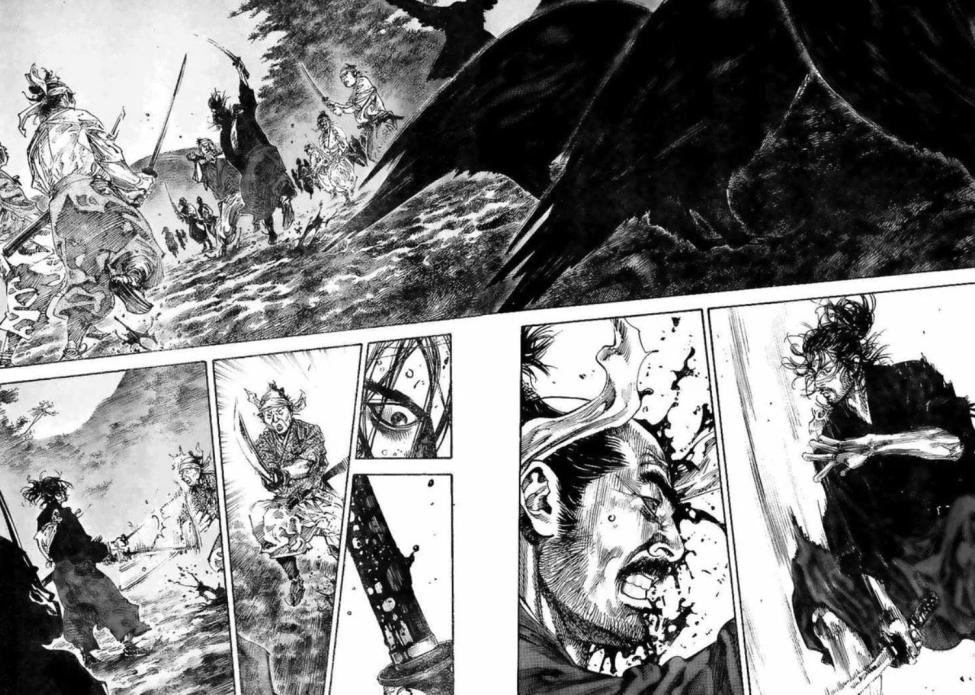
This is a key point in the story because, in addition to having an important impact on Musashi’s reputation and his relationship with the people around him, he himself starts to reflect on the violence in the path he travels, generating new internal conflicts for the character. To begin with, questioning the real meaning of a life based on blood and pain. And this is something he learned from his own experience, but which he had also been warned about by his own master in the past.

Musashi’s relationship with violence is very complex and multi-layered. And although his path creates situations of acts like this, he ends up recognizing the impacts of this on his life and on the lives of everyone around him. Musashi emerges from this event as a broken man, physically and emotionally. He begins to meditate more, becomes more introspective and reflective. And starts to create deeper connections with people that are somehow important to him.
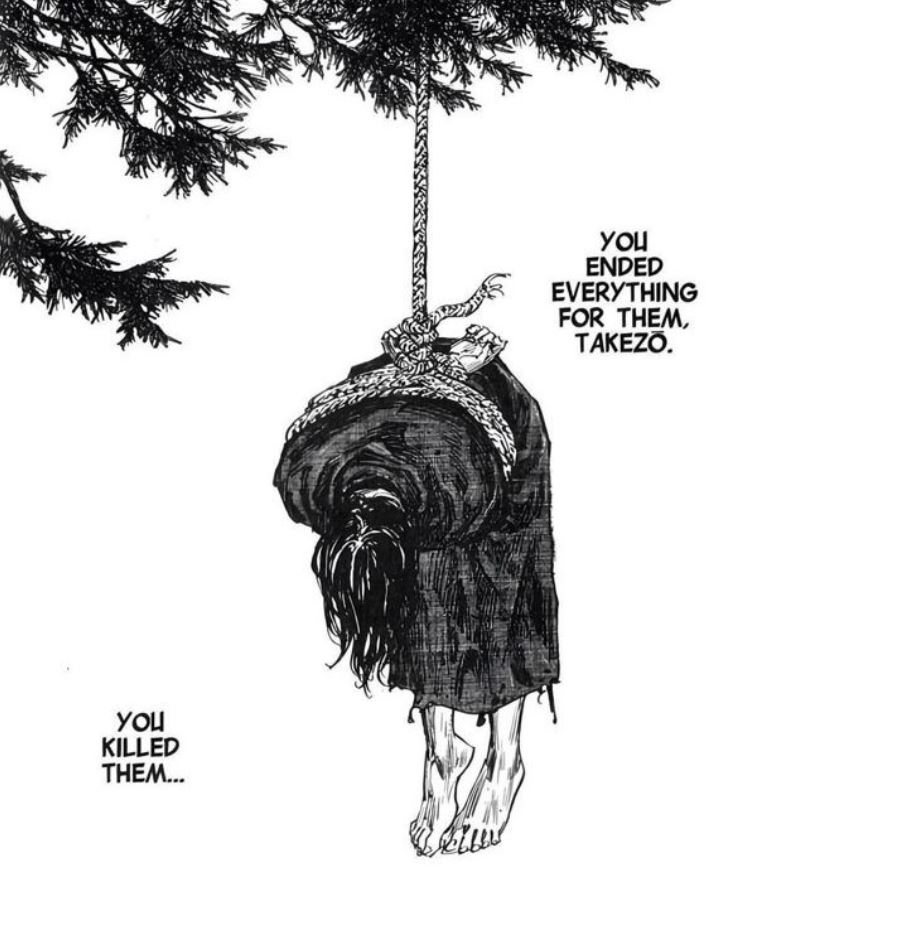
The meaning of life
“Smile more”
The last chapters of Vagabond are maybe the most important. Now we see a Musashi completely removed from any greed, violence or selfishness. Spending time with a group of farmers, he is faced with life in its simplest form. With men, not warriors. With kindness and not with violence. And I think that there, Musashi really became a strong person, because that’s where he became a better person too. Musashi strips off everything he has carried in life and returns to emptiness. He surrenders to infinity.

Within the void, within infinity, everything exists. He can do anything, he is not limited, words do not exist. Those who live for themselves, as Musashi once did, are limited. Those who help others, who see the infinity that exists within other people as well, and really use whatever they can to do some good instead of devoting themselves to reducing them, these people are truly free.
Musashi has become a kind man at last. And maybe that’s our true purpose in life: To become the best version of ourselves.
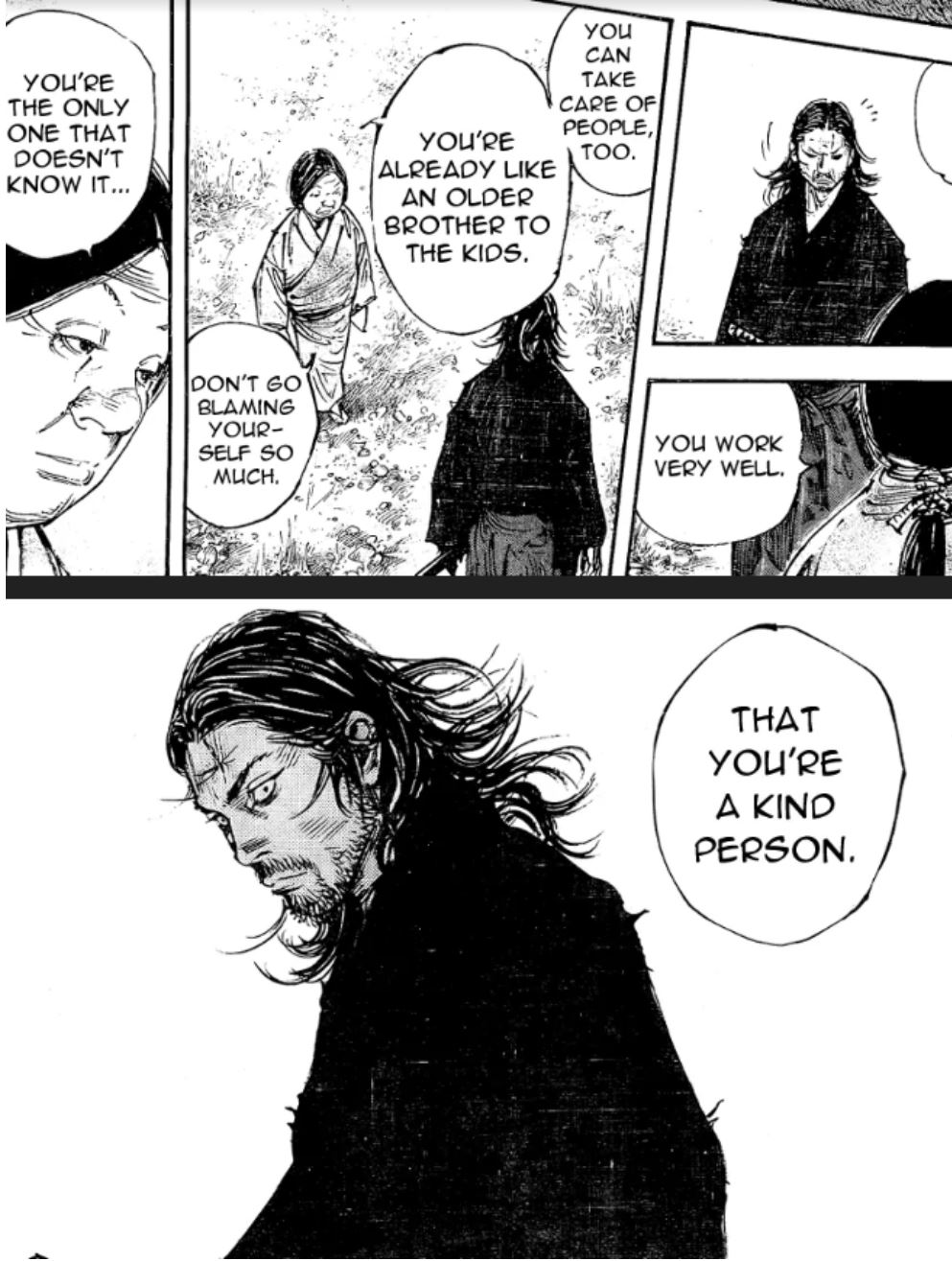
A whole universe inside us
Miyamoto Musashi was not only the main character of Vagabond but also a real and famous Samurai. He also wrote a book, called “The book of five rings”, where he reflect on strategy. During his lifetime, Musashi himself shows how our strength comes from within, not through external means.
“There is nothing outside of yourself that can ever enable you to get better, stronger, richer, quicker, or smarter. Everything is within. Everything exists. Seek nothing outside of yourself.”
Vagabond reflects this concept in Musashi’s trajectory and, those who read the work, certainly reflect on this too. We all have our own purpose, our own path and we all have a universe of things inside us. We will fall, but if we lift our heads and, above all, if we are kinder, we will reach our own meaning and happiness in life. By overcoming pride and ego and understanding our role in relation to others, we become truly strong.
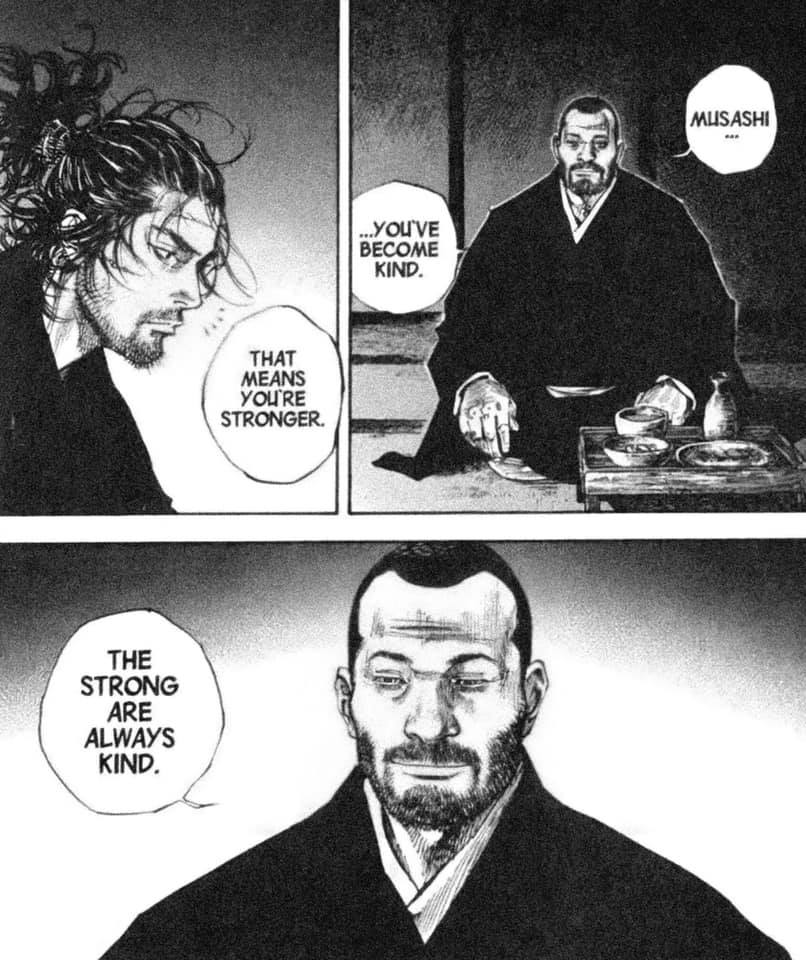
This is Vagabond’s greatest legacy and perhaps carrying this concept can make us better people. And, who knows, one day we can become kinder too.

What do you think? Leave a comment.
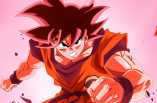




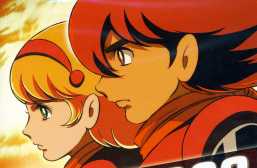
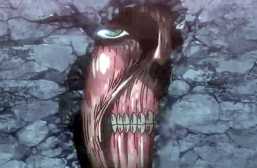
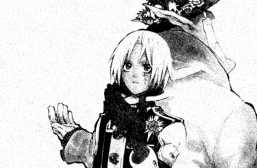

Your passion for this shine through.
It is my love letter ♥
It is trully a passion! ♥
I’ve never been into Vagabond as much as other people who have read it, but this article makes me feel a sudden intense appreciation for this series.
Just go for it 🙂
It’s a beautiful journey!
Forever one of my favorite stories of all time. Musashi is one of my favorite characters of all time. I’ll never forget the life lessons Inoue has taught me by way of Musashi’s journey.
Same feeling here! ♥
I can’t even tell you how many times I’ve cried during my first readthrough, the feels within this story are truly special. Such an emotional ride it’s been. I hope one day Inoue Takehiko decides to finish this story and hopefully we’ll get a masterful adaptation just like Vinland Saga got so far. But the incredible art makes it really difficult to get a faithful adaption I’d imagine. Nonetheless this masterpiece is one of my favs ever, just up there with Berserk and Vinland Saga.
I wish it would get an adaptation too, just like Slam Dunk. The art style is similar (obviously) and every time I see Musashi while reading the manga, I also see Hanamichi Sakuragi because they look so much alike.
I needed someone other than my girlfriend to gush about this series to.
Vagabond is literally the best manga of all time. It resonates with many teens in the way that can help them to become better. As for me, this manga is about fighting against your anger and understanding the value of life, but not only your own one, yet the value of other people’s lives. The main character is not fictional one, as Guts or Thorfin for example, he’s the real person living in the real world and dealing with the real problems, it is the second reason why I find this manga to resonate with me and others.
I just finished Vagabond like 1 hour ago and it truly made me reflect on myself for the past hour just sitting and thinking.
That is the magic of Vagabond.
Vagabond is one of the few stories I can genuinely say made me want to be a better person. I highly suggest it to anybody if they haven’t read it. To me a story about looking within oneself and realizing that all you ever need is already within you. The way Musashi, Matachi, and Kojiro all show you 3 different views of the world is beautiful along with Musashi meeting so many people and seeing parts of himself in all of them.
For me reading vagabond feels relaxing in an odd way.
My favorite moment in this entire manga is when takuan says musashi has become kinder then musashi proceeds to clutch 1v70 against the yoshioka school.
hahahah he defeated them in the kindest way ever!
He slaughtered the school, while being kind and collective (most of the time at least).
When i was 17 i read it but not convinced in anything but the art. And now when im older 23 i read it again and it somehow changed my life, my prospective on problems and relationships,
There are stories and philosophical messages that u can’t understand till u reach a certain point in life and certain point in collective experience.
Exactly. For many things in life, you need time to trully understand. Keep going, Zack!
Honestly I respect Miyomoto Musashi a lot, it’s not everyday you can meet someone who wields more then one sword and win (yes Ik short sword) I respect him alot, especially in Baki(probably not realistic) but even he was challenge for everyone in that universe because of his blind determination to be the best, no the strongest underneath the sun. That’s pure will and the power the back it up.
There are really only 2 kinds of people in this world : ones who prefer berserk and ones who prefer vegabond . They are almost Completely opposite. Berserk is more about aggression and hate and vegabond about flow and spirituality.
I’m sorry to bring berserk into this but i can’t relate with people that say vegabond is better than berserk . Both are legendary . I just relate to berserk more.
Vagabond helped guide me into a beautiful view on life, also it’s inspired me into martial arts and to always try better myself. Life is short and I want to die knowing I gave the life I live life value. I’ve lived a beautiful life so far, I’m married, I’m no longer the broken boy I once was who only saw darkness and didn’t want to live but years of growth I’ve let go of toxic people in my life and have a beautiful family, that’s not blood related. Family isn’t always blood it’s who is there for you. For everyone, make most of everyday, do what you love and makes your mind body and soul happy.
I am almost done reading it and damn, I was reluctant at reading it but after a few chapters it got me hooked, the internal battles of musashi resonated with me.
Vagabond is great but this doesn’t mean that their fandom is.
Only once Musashi let other people into his life and tries to connect to them, only then does he truly become strong. The farming Ark was peak Vagabond, it was him trying to fight for other people and sacrificing his own body and health.
Is the manga 12 volumes? I want to buy the Manga and make sure the story at that point at least has closure.
I just ordered volumes 1-12.
Finished reading up to 200 chapters and there’s still more (127 chapters). But I can say one word, vagabond is a MASTERPIECE. The art of takehiko inoue can’t be expressed…
Mappa plz do vagabond.
I’ve read vagabond once, and I haven’t thought about the meaning of the story too much as it’s not something I search in this media. This article and comment section made start reading it with a bigger mindset. Thank you guys.
Vagabond along with beserk and vinland saga encompass different viewpoints and genres (not so much vagabond and vinland) but they really go to show the potential of manga and the height of perfection it can be taken to.
My favorite manga, it changed my life.
I just started this series last week and i made it to chapter 70 in 2 days, this series got me hooked immediately.
I thought the series was good, but I read it like 8 years ago and monthly updates. One day I will reread it but I honestly forgot about much of it, didn’t leave to much of an impression on me compared to Inoue’s other works Real and Slam Dunk.
For me reading Vagabond was the turning point of my life where i realised a lots of things, i am very grateful for the masterpiece Vagabond is.
I really admire Vagabond for how they pursue the themes to see beyond the goals that one sets for oneself. It captures the essence of why go through harsh struggles and setbacks, knowing that one day we will all wither away, possibly even tomorrow. It’s not about when you die, but how you live. Are you struggling for something solely for money and other materialistic assets, or because it’s a part of you? Youre not living the life, YOU are the life.
Vagabond is the reason i’m happy now, and after that, everything seem to be like a breeze.
Vagabond was my first manga, the story really struck and it keeps me engaged every chapter plus the art is very beautiful. I heard the author is planning on returning to it and yeah its about time this masterpiece comes back💯👌
This was my first manga and was blown away, I feel like the bar has been set too high now though? Any recommendations?
Good night punpun
21st century boys
Berserk
Vinland Saga
Monster
I honestly loved the farming arc. It was so beautiful watching Takezo grow from a cold hearted killer – to a softer, kinder and more thoughtful human being.
Matahachi the most relatable person in the manga.
I read this when I was 16 and it changed me forever.
It’s funny, I have the volumes on my shelf and was looking at them today and I told myself “I really should start reading Vagabond” than The Artifice posts this article.
i love vagabond….inoue should continiue it but i respect his hiatus.
Just seeing Musashi naturally grow into a better, kinder person has given me immense hope.
Matahachi is the best mc even and you can’t change my mind.
Well, I agreed.
It’s interesting how gardening in anime/manga is shown as some sort of a path to peace, happiness and fulfillment.
Personally, Takehiko Inoue and Vagabond are the best thing to ever exist.
Vagabond is one of the reasons why I became fascinated by Japan.
I’m actually reading the audiobook based off of Musashi right now. So far it’s really good.
This manga is a masterpiece and it’s everything no anime has these days it’s so witty.
I mean, the artwork itself deserves praise!
I think vagabond might be better than berserk for me. As you get older that becomes the case.
Deserves an Anime.